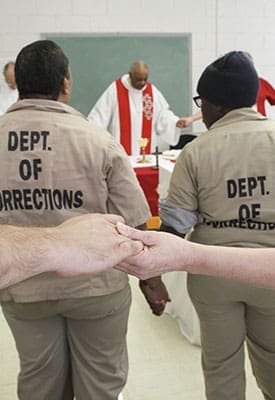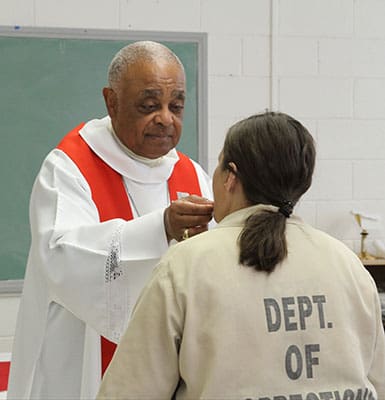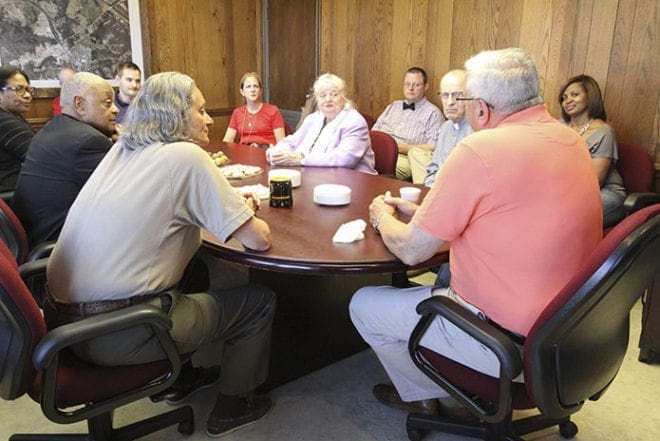Archbishop Wilton D. Gregory, center, confirms Amy Ruiz, one of the five female inmates he confirmed during a May 2 liturgy at Arrendale State Prison, Alto. The 29-year-old mother of four children took Guadalupe as her confirmation name. Looking on is Deacon Bernard Casey of St. Thomas Aquinas Church, Alpharetta. Archbishop Gregory also baptized an inmate. Photo By Michael Alexander
Ministry in women’s prison in Alto leads five to seek confirmation
By NICHOLE GOLDEN, Staff Writer | Published June 1, 2017 | En Español
ALTO—Five inmates of Arrendale State Prison for women in rural Habersham County were confirmed in the Catholic Church May 2, receiving the sacrament in the prison.
Archbishop Wilton D. Gregory celebrated the Tuesday evening Mass with 22 inmates and volunteers from the St. Joseph Cafasso Prison Ministries and Deacon Richard Tolcher, director of the archdiocesan Prison and Jail Ministry.

Transitional deacon Brian McNavish joins hands with an inmate during the praying of the Our Father. Photo By Michael Alexander
Earlier the archbishop met with Warden Kathleen Kennedy and chaplain Susan Bishop.
Paul Caruso, a parishioner of St. Thomas Aquinas Church in Alpharetta, founded the nonprofit St. Joseph Cafasso ministry. He and Deacon Bernie Casey visit Arrendale with a team of volunteers. During a two-hour block of time on Tuesdays, they teach Christian initiation classes, lead prayer and hold Communion services. When available, priests come to hear confessions and celebrate Mass in a concrete-block classroom.
As the group waited for inmates to arrive from dormitories, some of the women helped Deacon Casey and the archbishop prepare the altar. Some chatted while others sat quietly with rosary beads in hand.
Caruso gave his customary reminder to the women about proper demeanor for Mass.
“No one talks. That’s how Mama raised you. It’s called respect,” said Caruso. “This is the house of God.”
“It is a privilege for me to be able to celebrate with you,” Archbishop Gregory told the women. “I’m glad we’re running out of chairs.”
Just home from Rome, Italy, the archbishop shared details of visiting the Basilica of St. John Lateran and attending Mass at St. Peter’s Basilica.
Archbishop Gregory said although the stained glass windows and stones of basilicas can be inspiring, there is no difference in celebrating Mass in Rome or in prison.
“Because the church is here. The church is never a building,” Archbishop Gregory said. “Because the people are the church in the most important and profound way.”
Whether inside or outside of prison walls, what matters is how people come together, he said.
“The church is happening because we are gathered in faith,” said the archbishop. “It’s the same church because it’s the same Lord. It’s the Lord who makes it holy.”
It is the Lord who makes us the church, regardless of backgrounds or how we were raised, emphasized the archbishop.
“We praise him for his love and fidelity,” he said.
St. Michael the Archangel prayer cards
The archbishop first called Cameron Phillips Hunter forward. She received three sacraments of initiation—baptism, confirmation and the Eucharist.
“Do you reject Satan? And all his works? And all his empty promises?” the archbishop asked Hunter before baptism. She answered, “I do.”
The baptismal font was a stainless steel bowl atop a stand draped in a white cloth. Hunter bowed her head over the bowl to receive the sacrament as the archbishop poured a small amount of water from above.
The newly baptized woman beamed as fellow inmates clapped.
Amy Ruiz and three other inmates received the sacrament of confirmation or both confirmation and the Eucharist. The other three women cannot be identified because of conditions of sentencing. They chose the confirmation names of Mary, Genevieve and Catherine Rose.
A Florida native, Mary chose the name because it is her mother’s. Her father died since she entered prison.

Archbishop Wilton D. Gregory distributes the Body of Christ to an inmate during an evening Mass at Arrendale State Prison, Alto, May 2. Photo By Michael Alexander
The archbishop presented a pocket-size New Testament to each of those confirmed and St. Michael the Archangel prayer cards to all of the women at Mass.
Archbishop Gregory acknowledged the volunteers and inmates who helped prepare the women for the sacraments by serving as sponsors.
“I thank them from the bottom of my heart,” he said.
Ruiz, born in Mexico, is 11 months into a 12-year prison sentence for involuntary manslaughter and related charges. She is the mother of four young children.
During the Mass, Ruiz served as a lector. She chose the confirmation name of Guadalupe.
“I was born December 12,” she explained. “My dad always told me, I’m his Guadalupe.”
Ruiz, whose children are being raised by her husband, receives letters but few visits.
“It’s really hard,” she said.
Attending Mass weekly at the prison helps give her strength.
“I want to be an example for my children,” she said about faith. “My dad’s always put an example for me.”
One inmate, raised a Baptist, chose the name Genevieve after learning of the saint’s acts of charity. She began to explore the Catholic faith in prison and said that her mother’s good friend is Catholic.
“I love saying the rosary,” said Genevieve.
To be released from Arrendale in 2019, Genevieve is worried about a loved one with cancer. She is thankful for the prayers and support of the volunteers and Father Thad Rudd, a priest who visits frequently and heard her first confession.
She attends every Mass there and is encouraged by the Catholic faith.
“I just love it; It gives me such peace,” she said. “It gets me through each week.”
A cardinal’s example
Following Mass, Archbishop Gregory and Deacon Tolcher met with an inmate unable to attend liturgies because she is segregated from the general prison population. She received the Eucharist for the first time in many years.
“It’s probably the most powerful thing I’ve seen in a long time,” said Deacon Tolcher.
The warden and chaplain provided an overview of Arrendale’s vocational training programs to the archbishop. At capacity, the prison can have up to 1,476 inmates, both adults and juveniles convicted of felonies.
The academic offerings include GED and literacy programs. Vocational training ranges from auto mechanics to woodworking and welding. Warden Kennedy said programs are all designed to keep people from returning to prison.
The Georgia Department of Agriculture works with the Department of Corrections to offer an equine rescue program at Arrendale. Participants learn veterinary assisting skills while caring for horses.
Archbishop Gregory, in turn, shared how he began visiting jails as a seminarian and then as a priest assisting Cardinal Joseph Bernardin of the Archdiocese of Chicago.

(Clockwise, from near end of the table) Deacon Richard Tolcher speaks during an informal gathering in the Arrendale State Prison conference room as Warden Kathleen Kennedy, Archbishop Wilton D. Gregory, prison ministry volunteers Dolly Fairclough of St. Thomas Aquinas Church, Alpharetta, transitional deacon Brian McNavish, Lisa Corcoran, chaplain Susan Bishop and Deacon Bernard Casey of St. Thomas Aquinas Church sit around the table. Seated in the background against the wall are the chaplain’s secretary Randall Frye, left, and deputy warden of care and treatment, Myra Orsborn. Anthony Dewberry, deputy warden of security, and St. Thomas Aquinas’ Paul Caruso, not pictured, were also present. Photo By Michael Alexander
“I would take him to Cook County,” recalled the archbishop.
The Cook County Jail in Chicago takes up eight city blocks and typically has a daily population of 9,000 inmates awaiting trial. It would prove to be invaluable pastoral experience for Archbishop Gregory. He visits Georgia’s death row inmates at Georgia Diagnostic and Classification Prison in Jackson whenever possible.
He met with one man prior to execution whose only request was for the archbishop to send a letter to the inmate’s estranged daughters. Archbishop Gregory heard the last confession of Catholic inmate Josh Bishop before his 2016 execution, telling Deacon Tolcher afterward, “That’s why I became a priest.”
Clergy needed in prison ministry
In the meeting with prison staff and ministry volunteers, Archbishop Gregory said his interaction with others, including prisoners, is most important.
“I have administrative responsibilities that I have to do, but that’s not what warms the heart,” he said.
The archbishop expressed delight that Caruso and Deacon Casey have made work at Arrendale a priority.
“This has been a very faithful team,” said Bishop, the prison chaplain, about the Catholic volunteers. “Rain, sleet or snow, you can always count on this team here.”
Rev. Mr. Brian McNavish, a transitional deacon serving at St. Thomas Aquinas Church, has been recruited by Caruso to assist with the ministry. Rev. Mr. McNavish is to be ordained a priest for the archdiocese in 2018.
Caruso hopes seminarians will explore and consider prison ministry, particularly after receiving parish assignments.
“I want them to look at their area and see if there’s a jail or prison, and remember and go in,” he said.
Rev. Mr. McNavish has found visiting the prison to be a “very powerful” experience. He is interested in helping those in jail, in hospitals and all who suffer.
“For me, it’s what I’m attracted to,” he said.
He said it’s about the “constant invitation” to be close to people.
“That’s what kept me in seminary,” he said.